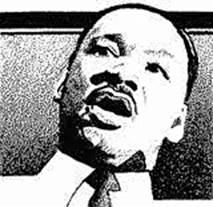The Reverend Martin Luther King compared himself to Moses who led his people out of slavery, saw the Promised Land, but never got there himself.
In April of 1968, Martin Luther King was in Memphis, Tennessee supporting a garbage workers’ strike.
On the evening of April 3rd, King told the congregation, “I don’t know what will happen now.” He said he’d “been to the mountain top” and “seen the Promised Land” but “I may not get there with you.”
His promise, however, was that “we, as a people, will get to the Promised Land.”
Toward evening, that next day, April 4th, King stepped out on the balcony of the Lorraine Hotel in Memphis, Tennessee.
A rifleman shot a .30-06 caliber bullet that broke Dr. King’s jaw, cut through his neck and spinal cord, and the slug lay spent in his shoulder blade. King died.
Robert Kennedy said in Indianapolis to a crowd that had not yet heard of King’s death that we must “tame the savageness of man and to make gentle the life of this world.”
King couldn’t have agreed more and his prescription to reach the Promised Land was to challenge “the triple evils of racism, economic exploitation, and militarism.”
We know today that the Supreme Court decision in Dred Scott, deciding that a man was property, was wrong.
But we don’t’ seem to appreciate that a Supreme Court that compromises voting rights is also wrong. Continue reading

